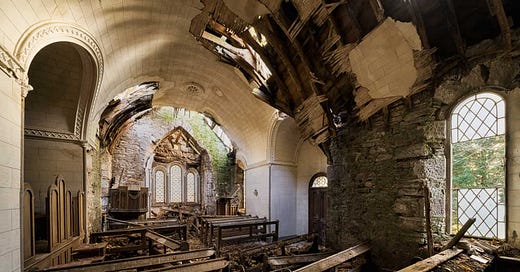The boy had grown, though in truth he never quite felt like a man. Not in the manner the desert made men—hard, unbending, carved by heat and silence into something that bore little resemblance to softness or memory. He had shouldered the burdens expected of him: driven cattle north through sleet and wildfire, swung a hammer on the rails until the calluses felt permanent, buried his father with barely a word and his mother with more ritual than she’d ever asked for. The rites of adulthood, they called it. He never told anyone that what he remembered most clearly from those years wasn’t the weight of labor or the loss of kin—but the sound of a bell he hadn’t heard in decades.
That bell had only rung once each day, at sundown. Not to announce, but to remind. And though time had stolen many details from him—faces, smells, the names of horses and half-forgotten towns—the tone of that bell clung to him like dust. It had rung, once, when he was a boy, and the sound had settled somewhere deep behind his ribs, where no years could reach it.
So when the noise of the world grew thin, when the ache in his hands no longer came from work but from time, he packed a few things and rode south. No map, no message. Just a direction he’d been circling for twenty years.
The desert hadn’t changed. It never did. Its memory ran deeper than man's, and it didn’t much care who came or went. The mesquite still clawed the trail. The sky still hung vast and judgmental. But the chapel on Coyote Bluff—what was left of it—stood like a relic of a myth only he still half believed. The wooden beams had collapsed. Wind had chewed the adobe walls down to their bones. The bell—black, cracked, and half-swallowed by sand—rested like a relic fallen from heaven or some lesser place.
He dismounted slowly, the way men do when their knees start arguing with gravity. Step by step, he climbed the bluff, feeling the same boy’s heart inside his chest, only heavier and quieter now. He knelt beside the bell, traced the fracture with his fingers—careful, reverent, like it might still burn. It felt less like damage and more like a seam between worlds.
And then he saw the carving. Half-hidden beneath lichen and sun-bleached grit:
Keep ringing.
No name. No initials. No date. Just those two words, carved shallow, like the man who left them knew they wouldn’t need depth to endure. Around him, the hush was thick—dense with memory, or maybe just dust.
He removed his hat, sat beside the wreckage. Time behaved differently up there. It didn’t pass so much as settle. The sun tilted. Shadows stretched like old regrets. And then, without fanfare or forethought, he tore a strip of cloth from his coat, wrapped his knuckles, and struck the bell’s edge.
It didn’t ring.
It thudded.
A flat, broken note that wasn’t music but wasn’t nothing. It was something. A sound unbeautiful but real. He struck it again. And again. Slow, steady. No rhythm, no prayer.
He didn’t do it for Elias, wherever he’d gone. Not for the chapel or the town that had burned out of existence. Not even for the boy he once was, who’d sat right there, thirsty and wide-eyed, asking questions he didn’t yet understand.
He did it because someone had once told him to keep ringing. Because something in him remembered what it felt like to be heard.
When the sun dropped and the coyotes woke in the valley below, he stood. Dusted his knees. The old ache returned, familiar now, like an old friend who’d stopped pretending not to be pain. He whispered—not to the bell, not to the dead, but to the silence itself:
“That’s enough.”
And then he turned toward the trail. He didn’t need the sound anymore. Didn’t need the bell, broken or whole.
Because in some deep, enduring way—he had become it.
Want to read some more? Enjoy one of these recent posts:
How I Barely Survived My First (12) Days on Substack
Creating When Words Confound You






Loved these lines: "The bell—black, cracked, and half-swallowed by sand—rested like a relic fallen from heaven or some lesser place." and "Because something in him remembered what it felt like to be heard." That last one especially seems to get at a lot more than just the sound of a bell.
You’ve packed a heap of beautiful prose into this chapter Ben, I’m looking forward to part 3 ! 🙏🏽